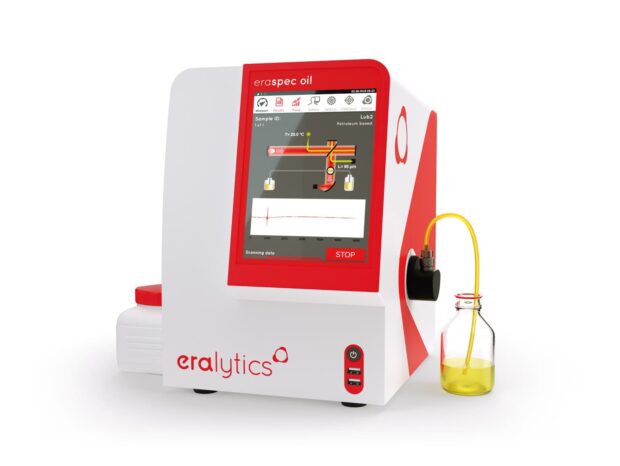Standard Test Method for Condition Monitoring of Oxidation in In-Service Petroleum and Hydrocarbon Based Lubricants by Trend Analysis Using Fourier Transform Infrared (FT-IR) Spectrometry.
Get more information about the standard at ASTM D7414-22.
ASTM D7414 is a standard test method for monitoring oxidation levels in in-service petroleum and hydrocarbon-based lubricants. Utilizing Fourier Transform Infrared (FT-IR) spectrometry, this method provides a rapid and straightforward approach to assess the buildup of oxidation products in lubricants, which is crucial for diagnosing machinery health and ensuring optimal performance.
Details
The ASTM D7414 test method involves collecting FT-IR spectra of in-service oil samples to monitor oxidation levels via compounds like aldehydes, ketones, esters, and carboxylic acids. This method is applicable to in-service petroleum and hydrocarbon-based lubricants, including diesel crankcase oils, motor oils, hydraulic fluids, gear oils, and compressor oils. It is not suitable for ester-based oils, such as polyol esters or phosphate esters.
Industries and Applications
ASTM D7414 is significant in various industries and applications, including:
- Automotive industry: Engine manufacturers and service centers utilize this method to assess the oxidation levels in engine oils, ensuring that lubricants maintain their protective qualities and engine components are safeguarded against wear.
- Industrial machinery: Operators of heavy machinery and hydraulic systems apply this standard to monitor the condition of lubricants, detecting oxidation that could lead to equipment malfunctions or reduced efficiency
- Aviation sector: Aviation maintenance teams employ this test method to evaluate turbine and hydraulic fluids, maintaining the reliability and safety of aircraft systems by preventing oxidation-related issues
- Marine industry: Shipping companies and marine engineers use this standard to monitor lubricants in ship engines and auxiliary machinery, ensuring efficient operation and preventing costly repairs due to oxidation-induced degradation
- Oil analysis laboratories: Specialized laboratories offering oil condition monitoring services implement this method to provide clients with accurate assessments of lubricant health, facilitating informed maintenance decisions and prolonging equipment lifespan
In summary, ASTM D7414 offers a reliable and standardized procedure for monitoring oxidation in in-service petroleum and hydrocarbon-based lubricants using FT-IR spectrometry. Its application is vital across multiple sectors to ensure equipment reliability, facilitate proactive maintenance, and optimize lubricant performance.
